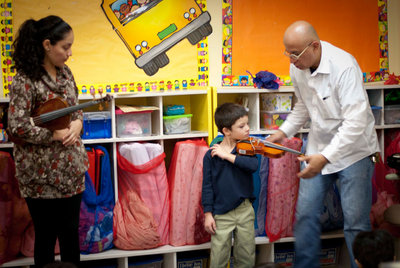Thirty-five students from the Union City Music Project, a non-profit afterschool program that employs Venezuela’s famous “El Sistema” musical education philosophy, will perform at the Dimenna Center in New York City this Wednesday as part of Carnegie Hall’s seasonal program, Voices from Latin America. Additionally, the children were treated to a concert at Carnegie Hall this weekend by the world-famous Simon Bolivar Symphony Orchestra.
The children, which range in age from 4 to 7, will be singing and playing xylophones alongside students from four other “El Sistema”- based programs, all of which are located in New York.
“It’s a great honor, I think, to be representing New Jersey at this concert,” said the project’s founder and director, Melina Garcia. “We were excited to be invited. Hopefully it will shed some light on what we’re trying to accomplish here.”
Members of the Orchestra, which is based in Venezuela and has its roots in the “El Sistema” tradition, will visit the program this Tuesday, Dec. 11, to help the students prepare for Wednesday’s concert. In addition, Gustavo Dudamel, a world-famous conductor and student of “El Sistema,” will be on hand Wednesday to watch the children perform.
Garcia founded the program about a year ago. It has since grown into one of the most successful grassroots education projects in the area.
The program, which portrays music as a metaphor for real life and the orchestra as a microcosm of society, infuses life lessons that can sometimes fall through the cracks.
“In a world that’s so fast-paced, with so many distractions, it can be hard for kids to learn discipline and teamwork skills,” said Garcia, “but where better than in an orchestra? If you learn music as an individual, you care only about yourself, but if you learn surrounded by other children, then you learn to care about everyone.”
The children will join the full orchestra of students for renditions of “Simple Gifts,” “Ode to Joy,” and a song written specially for the concert, “Venezuela.”
“We’re creating a musical community,” said Samuel Marchan, the program’s musical director. “There are challenges because the students are still young, but we are instilling crucial fundamentals, like rhythm and pitch.”
“If you learn music as an individual, you care only about yourself, but if you learn surrounded by other children, then you learn to care about everyone.” – Melina Garcia
__________
Municipal support
The students have been practicing rigorously (the group meets three times during the week, and on Saturdays) to prepare for the concert, and have received substantial help along the way from the Union City Board of Education, which provided them with several new instruments last month. In total, Garcia received violins, cellos, recorders and xylophones.
Additionally, the board allowed the program to continue operating out of the Eugenio Maria de Hostos Early Childhood Education Center into the school year, after they used it throughout last summer.
“The city has been wonderful in helping this program move along,” said Garcia. “I think they see the benefits for the children, to have free programs like this, because so many families here cannot afford things like this.”
Garcia said that a year ago, when she became interested in initiating the program, she had met with Mayor Brian Stack, who was supportive. Stack put in a call to Superintendent of Schools Stanley Sanger, who then arranged for the instruments to be donated.
“The mayor is very proud of Union City’s young musicians,” said Stack’s spokesman, Mark Albiez, “and he congratulates them on their upcoming performance at the Dimenna Center.”
The grassroots aspect
Garcia, who quit her job at the Clinton Foundation in New York in order to establish the music project in Union City, is originally from Venezuela and has been aware of the “El Sistema” tradition for many years, though she is neither a musician nor an educator. In her home country, the system is implemented in low-income areas in order to prevent at-risk youths from getting enveloped into a life of crime.
The same idea can be easily applied to Union City, said Garcia.
“Union City has all kinds of cultural potential, but the area has a lot of need, there is a lot of poverty, and families don’t have the ability to pay for afterschool programs, and the kids end up getting in trouble,” she said. “I knew the program would eventually come to New Jersey, but Union City is always overlooked, and I knew it would go to Montclair or Newark or something, so I said ‘I’ll just do it here!’”
Gabriela Oyarzun, who has three children in the program, said that the Music Project is exactly the type of program Union City needs more of.
“The music is a great way to teach them a lot of lessons and teach them about responsibility,” she said. “It is a great way for them to express themselves in a positive way.”
Garcia said that her inspiration for the program came from a Mother Theresa quotation: “We think sometimes that poverty is only being hungry, naked and homeless. The poverty of being unwanted, unloved and uncared for is the greatest poverty.”
“It’s true, what Mother Theresa said. But, if you give a child an instrument, they are immediately somebody,” she said. “All of a sudden they have a power. And when they are in an orchestra, that is a powerful thing.”
